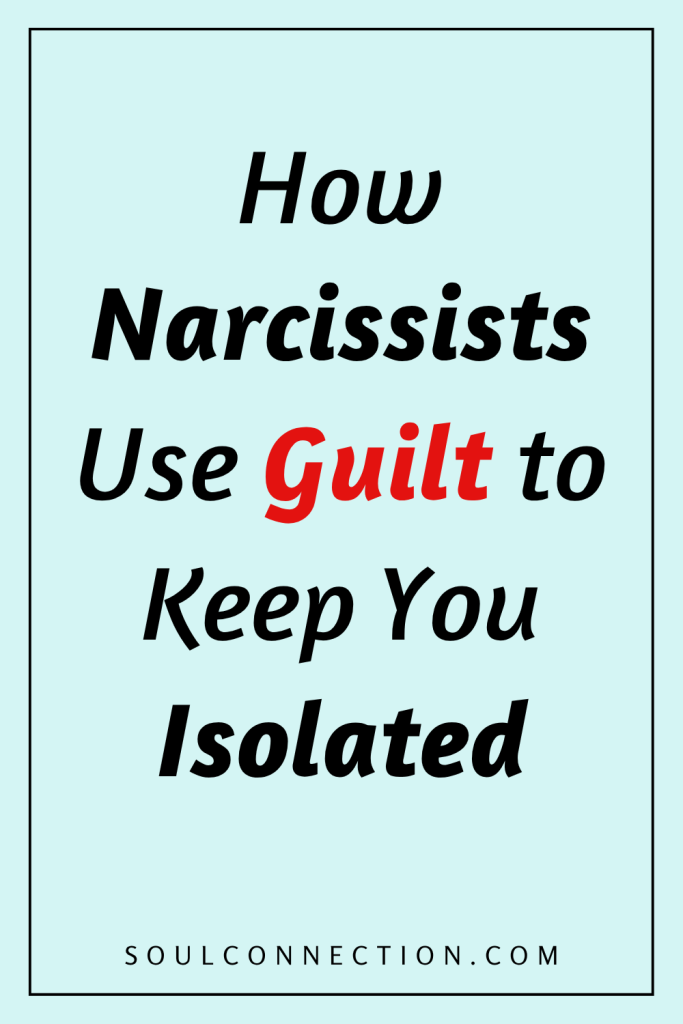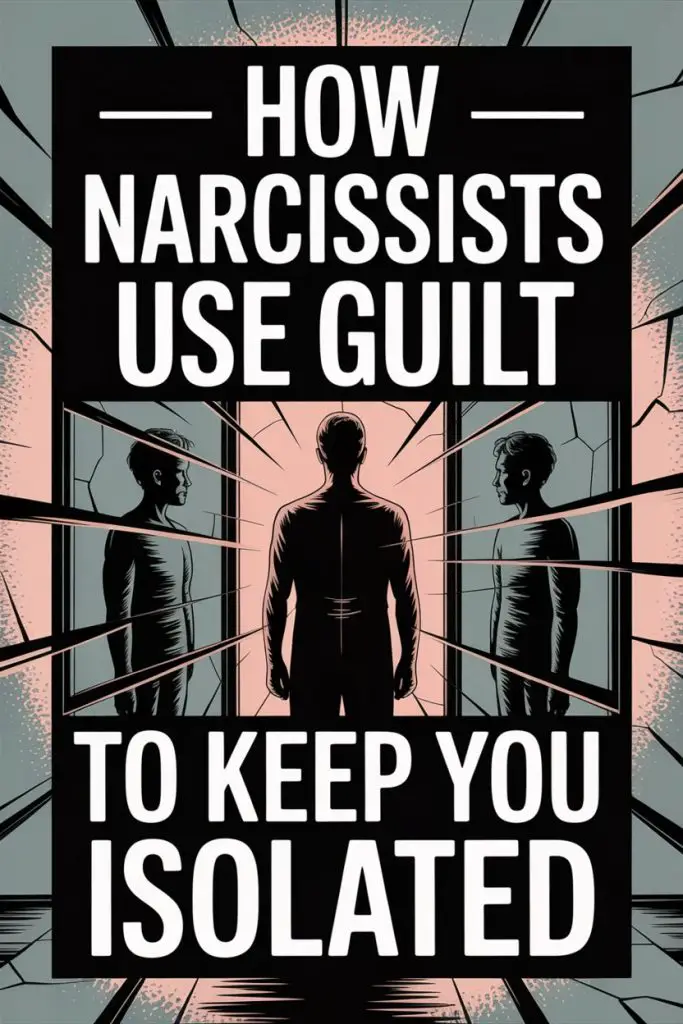Nothing says “healthy relationship” like someone who makes you feel bad for having friends or existing independently, right?
If you’ve ever wondered why you feel like the last biscuit in the tin—crumbling under pressure and alone on the plate—you might be tangled up with a narcissist.
And if you’re scratching your head, wondering how you arrived at this lonely tea party, guilt is probably the invisible hand stirring the pot.
Let’s pull back the curtain on one of narcissism’s favorite party tricks: wielding guilt like a Swiss Army knife to keep you all to themselves.
The Classic Playbook of Narcissistic Guilt-Tripping
Narcissists have a sixth sense for sniffing out what makes you tick—and then using it to keep you dancing to their tune. Guilt isn’t just an emotion they toss around casually; it’s their secret sauce.
Did you want to visit your mum this weekend? Suddenly, your partner looks at you like you’ve suggested buying a timeshare on the moon.
“But I thought we’d spend time together. Doesn’t our relationship matter to you?” And just like that, plans with your mum seem selfish.
This isn’t just a one-off. It’s a repeated pattern: any sign of independence or connection with the outside world becomes an opportunity for manipulation.
Why Guilt Works So Well
Guilt is the relationship equivalent of superglue, and narcissists know it. Most people want to be kind and considerate—two qualities a narcissist is more than happy to exploit.
They know you want to be seen as caring, so they reframe your normal, healthy choices as hurtful or disloyal. And guess what happens? You end up apologizing for things you have every right to do.
Next thing you know, you’re isolated, convinced you’re the villain for wanting dinner with friends.
Isolation: The Endgame
Getting you alone isn’t just about romance under the stars (unless those stars are also glaring at you disapprovingly). Narcissists isolate because the less support you have, the more power they get.
Friends or family might spot the manipulation, but if you’re feeling guilty for even texting them, you’ll keep your distance.
The result? You start to believe the narcissist’s version of reality. Their feelings become central; yours fade to background noise.
Before you know it, your social calendar is emptier than a public swimming pool in January.
The Subtle Art of “You’re So Selfish”
Ever heard, “I guess I’ll just eat dinner alone—again”? Or, “Everyone else always comes before me”? Congratulations, you’ve won a guilt trip to Isolation Island.
The narcissist won’t always shout or slam doors. Sometimes the real power move is a sad sigh, a pointed silence, or a tactically timed “I just miss you when you’re gone.” Suddenly you’re questioning if you’re the problem.
Emotional blackmail doesn’t need fireworks. Sometimes it’s the slow drip of disappointment that wears you down.
The Rewrite of History
Fancy a bit of revisionist history? Narcissists love it.
Say you spent last weekend with your family, and this weekend you want to see a friend. Now it’s, “You’re never here for me. You always put others first.”
Suddenly, two outings in a month become “always,” and you’re left defending yourself for a perfectly reasonable social life.
This rewriting of facts makes you doubt your own memory. If you’re constantly on the back foot, apologizing and explaining, you’re too busy to notice how isolated you’ve become.
The Martyr Routine
No one can play the victim quite like a narcissist in full martyr mode. “I just want you to be happy. If that means ignoring me, I’ll learn to live with it.” Cue dramatic sigh and longing gaze out the window.
Now, you’re not just dealing with guilt—you’ve also got a hefty side order of shame. Why are you making them suffer? Why aren’t you grateful for their selflessness? (Spoiler: actual selfless people don’t say things like this.)
Suddenly, spending time with anyone but them feels like a betrayal worthy of a soap opera.
Gaslighting: Warping Your Sense of Responsibility
Gaslighting deserves a medal for Best Supporting Manipulation. When you start to push back, don’t be surprised if the narcissist insists, “I never said you couldn’t go out, I just thought you’d care about my feelings.”
Now you’re stuck in a mental maze, questioning what’s real. Did you actually do something wrong? Or are you just sensitive? Gaslighting twists guilt until you’re apologizing for breathing too loudly.
When your sense of responsibility is warped, you stay put—because leaving would mean you’re the bad guy.
Love Bomb, With a Guilt Chaser
Narcissists love a grand gesture when things get dicey. After a guilt trip, you might get flowers, a lavish apology, or the sudden appearance of your favorite takeaway.
For a minute, it feels like you’re starring in a rom-com—until the next round of guilt arrives.
These sweet moments aren’t unconditional love; they’re bait. The message: “Look how much I do for you. How could you possibly hurt me by spending time with anyone else?”
The cycle keeps spinning: isolate, guilt, reward, repeat.
Turning Your Strengths Into Weapons
Empathy is a beautiful thing—unless you’re sharing your life with someone who uses it against you. Narcissists are uncanny at finding your soft spots: your need to care, your fear of hurting others, your loyalty.
That compassion, that urge to help, becomes the very rope that ties you up. Every act of kindness gets twisted until it serves the narcissist’s need for control and your need to not feel like a monster.
Guilt by Association
Even your friendships can become ammunition. Ever heard, “Funny how you have time for them, but not for me”? Or, “I just don’t think they’re good for you”?
Sometimes the narcissist goes the full detective and suggests your loved ones are the problem, not them.
Suddenly you’re torn between loyalty to your partner and loyalty to your support network.
Narcissists love to frame themselves as the only person who truly understands you—while everyone else is a suspicious character in their own personal whodunit.
How to Spot Guilt-Based Isolation in Your Relationship
Here’s the million-dollar question: is it just a rough patch… or are you being guilted into submission?
Watch for patterns, not isolated incidents. If every time you try to see friends or family, you’re met with sulking, accusations, or “poor me” routines, it’s not a coincidence.
If you feel anxious about making plans because you know there will be fallout—even if it’s just a heavy dose of silent treatment—that’s not a loving partnership. That’s emotional manipulation, plain and simple.
If you notice you’ve lost touch with people who matter, or you’re hiding your social life to avoid conflict, it’s time to get honest about what’s really going on.
Reclaiming Your Independence Without the Guilt
Here’s the bit where you get your own back—without turning into a villain in your own story.
Start with boundaries. A healthy relationship can handle you having a life. It’s fine to say, “I care about you, but I also need time with my mates.” (Translation: you’re not applying for a monastery.)
When the guilt trips roll in, try not to get sucked into defending every move. “I see you’re upset, but this is important to me.” Short, sweet, and not up for debate.
Rebuild your support network, even if it feels awkward at first. If you’ve been isolated, reconnecting can be scary—but it’s also your best defense against future manipulation.
If things escalate or you feel unsafe, reach out to a professional. Seriously. Even the most stubborn narcissist can’t gaslight a therapist. (And no, couples therapy won’t work unless your partner actually wants to change.)
When Guilt No Longer Works
Narcissists hate losing control more than they hate sharing the last slice of cake. Once you stop responding to guilt, expect pushback.
There may be more love bombing, more dramatic protests, maybe even veiled threats of what will happen if you “choose others over them.”
It’s uncomfortable, but it’s also a sign you’re reclaiming your life. When you refuse to carry their guilt, you make space for your own happiness—and for relationships built on trust, not manipulation.
Moving Toward Freedom
Breaking free from guilt-based isolation isn’t about becoming heartless. It’s about giving yourself permission to exist outside someone else’s emotional weather system.
Healthy love encourages connection, not captivity. If you’re feeling banged up by guilt, it’s not your fault, and you’re not alone.
Reclaiming your independence, one non-apology at a time, is the first step toward a life where you get to be loyal—to yourself.
Go on, make that phone call to your friend. The only person who should feel guilty right now is the one who made you believe you couldn’t.


